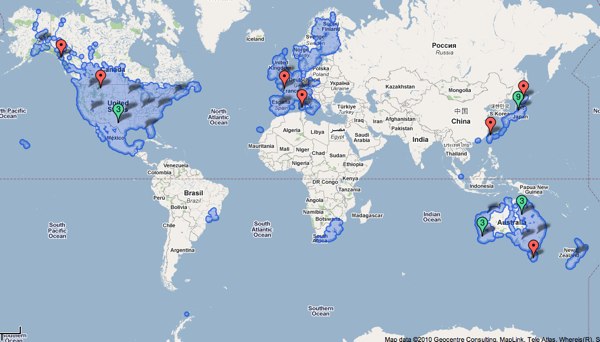In the Category interesting
is this the new google maps ui
Posted December 3rd, 2010 at 5:33 pm. There are 0 comments.Check out that sweet ‘other’ view option window in the upper right.
via 41 latitude
stopping the world
Posted December 2nd, 2010 at 10:42 am. There are 0 comments.via kottke
electric mountain
Posted November 30th, 2010 at 7:14 pm. There are 0 comments.
photo via ben cooper’s flickr
Deep inside the mountain is an 800m shaft, about 30m wide. During times of excess energy on the National Grid, water from the lake below is pumped up into the reservoir above the shaft. And when a surge of energy is needed on the grid, (say during a football match half-time), it’s released back into the lake, hurtling through the turbines and generating up to 1,320 MW from standstill in 12 seconds.
This isn’t all that surprising, after all it is how all watertowers work, but the name, Electric Mountain, the description of the semi-audible humming present at the site which is somewhere between hearing and feeling, gives the whole place a Tarkovskian type feeling of the Zone.
The wikipedia article about the Dinorwig Power Station has more details.
After we climbed out, I asked about the lake below. “You could say that it’s tidal, but with the television schedules, rather than the moon.”
Mind is blown.
via tom taylor
paths of flight
Posted November 29th, 2010 at 3:48 pm. There are 0 comments.more from GE
google street view coverage
Posted November 15th, 2010 at 10:27 pm. There are 0 comments.Google map showing all areas covered by Street View
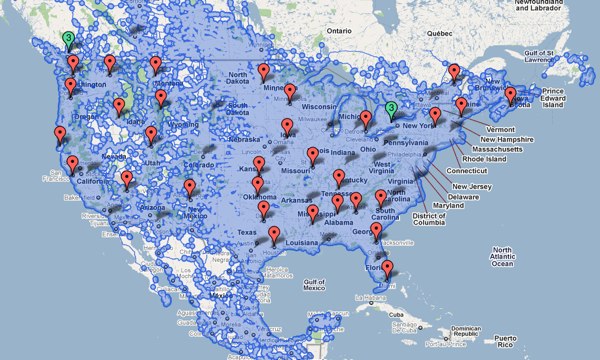
timelapse photo of a facebook photo album
Posted September 20th, 2010 at 11:13 am. There are 0 comments.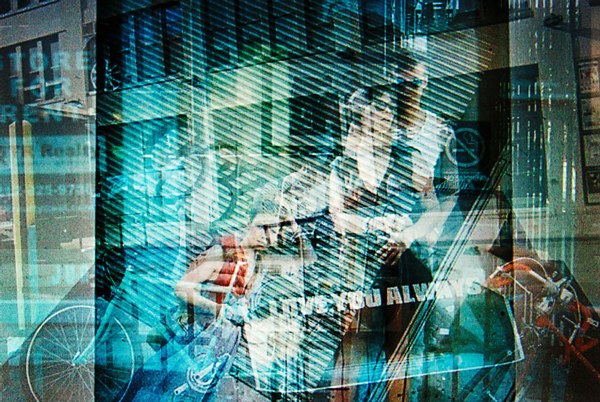
a more open place by Phillip Maisel
Google maps with just the placenames
Posted September 1st, 2010 at 7:36 pm. There are 0 comments.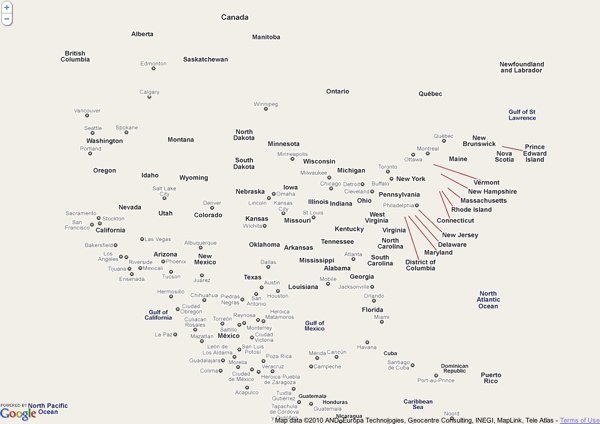
Fata Morgana by Damon Zucconi
chemical signatures in our drinks
Posted July 1st, 2010 at 10:00 am. There are 0 comments.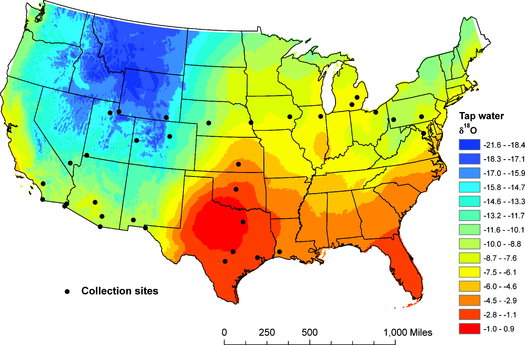
Trackable Beverages This tap water “isoscape” map shows how hydrogen and oxygen isotopes vary throughout the country. Geographic factors like latitude, altitude and proximity to coasts all play a role in this isotopic variation. The cities on the map show where the researchers tested tap water along with bottled water, soda and beer. ACS/Journal of Agricultural and Food Chemistry
These geographically specific signatures show up in human hair making a record of you travels a real possibility.
To test this theory, the scientists analyzed tap water from 33 cities and looked at isotope patterns in Dasani bottled water, Coca-Cola Classic and Budweiser. They found the beverage isotope pattern from those cities matched the tap water pattern — which makes sense, because many beverage companies produce their drinks regionally instead of in one main location. For example, if you drink a Bud in Utah, it probably came from the Anheuser-Busch plant in Fort Collins, Colo., not St. Louis.
via fresser
we used to put automobile test tracks on building roofs
Posted May 21st, 2010 at 12:14 pm. There are 0 comments.
Image via USC Architecture Dept.
Fiat Automobile’s Lingotto Factory in Turin Italy.
this week in mobile : week 21
Posted May 20th, 2010 at 5:07 pm. There are 0 comments.Engadget Coverage NY Times Bits Blog Coverage
At Google I/O, Googles developer conference, Android got lots of announcements and will be going to many new places – like your tv. In the presentations by executives they spent a good amount of time throwing digs at Apple, and prosthetising their openness.
Some of the interesting bits, first Android 2.2 FroYo and then Google TV (what!?)
Built in tethering, assuming your carrier supports it & wi-fi hotspot capability.
It runs apps 5X faster
Flash 10.1 runs on it – hot and at the expense of your battery say Engadget
Application updates are cleaned up – Update all now supported and can be set to automatically download
Purchase on the Web Marketplace and send to device over the air – very cool
Music store in the Marketplace – not much mentioned aside from downloading being demoed – potential very big deal here.
Stream music from your desktop – iTunes library etc – This is Simplify Media tech, a recent Google acquisition
Google Mobile AdSense – which of course make sense. Multiple ad formats from any support Ad Network, openness.
Google TV – Getting TV and the Web married, another vector for Google Ads, on your TV. Set top box UI is, um, Googley. Is that a mouse pointer I see? Yes.
Put Android Apps on your TV – If the app doesn’t require phone specific stuff it should run today.
And now your regularly scheduled mobile updates ie. non Google I/O stuff
View past graffiti after it has been cleaned up
Graffyard uses QR codes to show the visual history after graffiti has been painted over. Its a nice example of encoding the visual of the city onto itself. One can imagine a future where city walls have a secondary digital presence and all advertising, graffiti and signage takes place via a persistent visual augmented reality system. The city becomes a contiguous blank canvas, a physical platform encoded with embed tags for the reality we want to see. Maybe.
African Churches Embrace Mobile
Reminders to come to services, tithings and sharing of bible passages for study all via SMS
Marko Ahtisaari who heads up design and user experience answers some questions about how Nokia is moving to react to the mobile world that is seemingly running away from them. He focuses on a very narrow definition of mobility, which may be right, or not.
“I still think the whole industry is missing a trick,” said Mr Ahtisaari during a meet-the-press session in London yesterday. “All the touchscreen interfaces are very immersive. You have to put your head down. What Nokia is very good at is designing for mobile use: one-handed, in the pocket. Giving people the ability to have their head up again is critical to how we evolve user interfaces.”
Heads up vs. heads down is a very interesting distinction and one that raises many interesting points about mobile device usage in the public sphere. I think if Nokia can move forward with a singular, focused direction they will be positioning themselves strongly for a good segment of the market. Im not sure if that segment will be a big enough percentage to keep them afloat, and it would represent a distinct turn from the all things to all people position they have put themselves in. What about this though – more than 50% of Nokia smartphones use touch interface ?
Speaking of heads down staring into the glowing screen – A series of photos exploring peoples relationship to their mobiles. More focused than the Flickr Lost in Text pool, which is also quite good.
The dconstruct conference website
Stretch the window down to less than 800px wide and you got the mobile version. Very elegant.
More than a third of Android users rolling on 2.1
Data compiled from a 2 week period of users accessing the Android Marketplace. Please take with a grain of salt.
Airports now on the small glowing screen
More evidence of the trend of mobile screens replacing public displays. Not sure I want to try to download an app while I’m racing through a terminal to make a connection just to see what gate my flight got moved too but, hey.
A nice roundup of technologies and ideas that are shaping the products of tomorrow. Links to examples for each in the article. Do note that four of the five listed here have a strong locative component.
1. AR browsers for mobile: Layers of data embedded in the real world around you that you can toggle between. Applications for real estate, food & entertainment, retail. This use of augmented reality will become how we live; not just an app. But will we be holding up our phones for long?
2. Augmented Mobile Profile: A social user interface implementation of your public profile. Real time information about the people around you and their entire “clouded” identity–from business card to playlists, Facebook profile to thought capitol on Slideshare. One of the ultimate social/mobile integrations I’ve seen.
3. The Active Idle Screen: Replaces your current homescreen with personal and valuable information (weather, trivia, sports scores, horoscope, etc.) in addition to advertisements for deals/coupons. Will reach the lowest common denominator audience.
4. QR codes without the QR: Recognizing that camera phones are crappy, we can analyze the photos. Take a picture of something and you receive contextual results around it. Mixed with geotargeting, this becomes very powerful. (Reviews, Where to buy, etc.)
5. Data Conformity: Location-based content and services are the promise of mobile marketing. But it has to work across all devices, content providers, and mobile carriers–one of today’s greatest challenges. When the great aggregator arrives, it will help to bring data conformity and data consistency.
Worldwide Mobile Browser Share
Displayed very nicely as a world map
The film unfolds as the viewer visits different parts of the city. The more they travel, the more of the film they see. Whats great is the creators have released the technology behind it as open source, in addition to the first GPS film Nine Lives. This has to be better than the lame 3D that seems to be in fashion at the multiplex.
$12.7 Billion by 2014 in Location Based Services
A number thats as good as any and comes from Juniper Research. Whatever the numbers are predicted to be, location based services, hyper local advertising, geo targeted marketing and anything that has to do with exactly where you are at a given point in time – especially when you are not at your desk at work or in front of the television at home – is going to be a big deal. Period.
Helpful Guide for appropriate technology usage
Covers your basic situations of office, home, in car and the great outdoors. For instance usage of MacBookPro in the Great Outdoors should be avoided – the start up sound is bear for “bring it”.
[ iamtheweather powered by Wordpress And is definitely Not Plastic Bag ]
